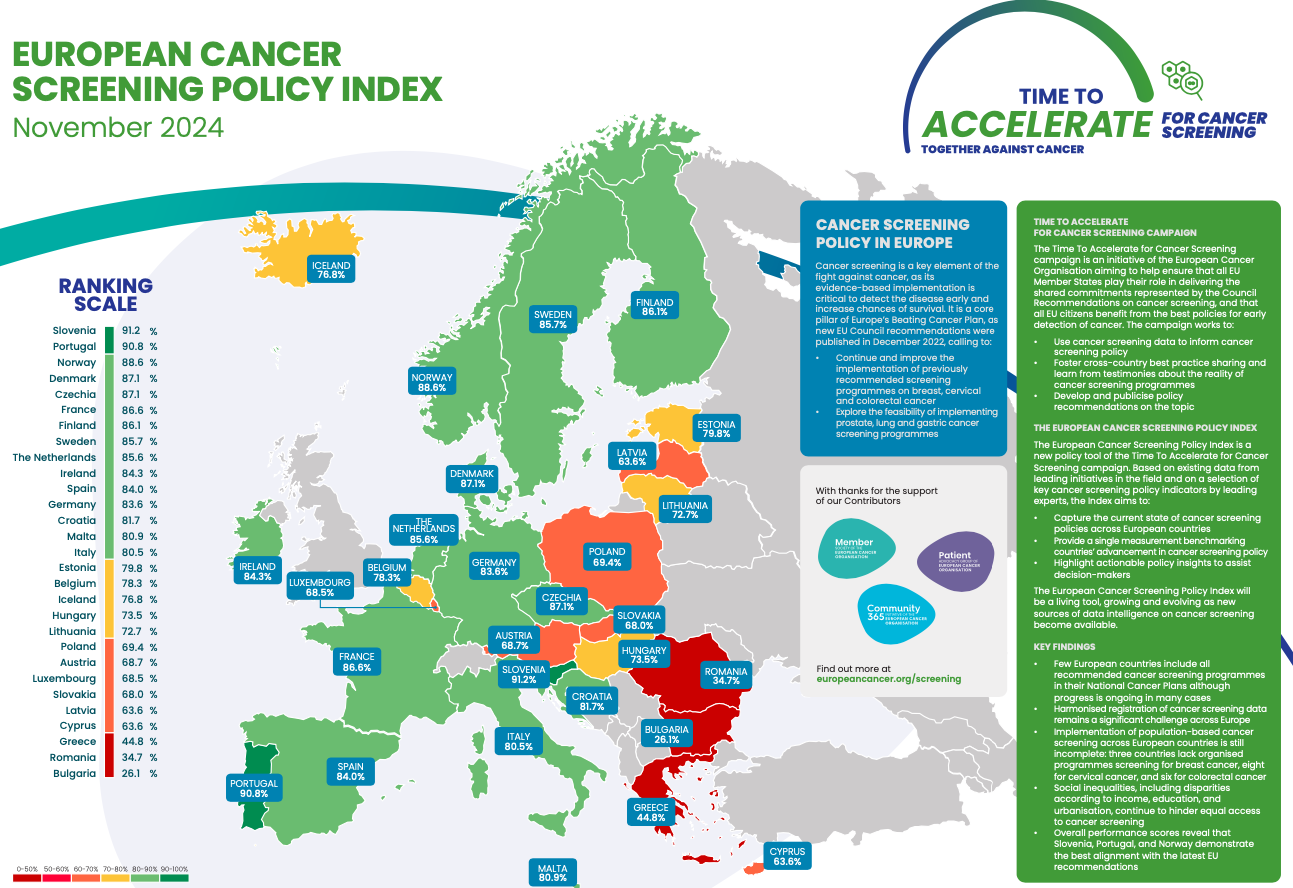Belgium ranked 17th out of the 29 countries assessed in the latest cancer screening policy index, the European Cancer Organisation (ECO) revealed on Thursday.
The country stood out from its European neighbours as one of the few Western countries to score below 80%. But the results should be interpreted with caution, according to the Belgian Cancer Registry’s cancer screening expert, Dr Koen Van Herck.
“I don’t blame [the researchers] because it is complex [...] but I think if they redid the research in two months, or maybe even tomorrow, then Belgium would be in the ‘green’.”
The policy index evaluates the extent to which EU Member States are following the 2022 cancer care recommendations from the EU Council, which called to improve and expand the screening programmes for different types of cancers.
 European Cancer Screening Policy Index. Credit: European Cancer Organisation.
European Cancer Screening Policy Index. Credit: European Cancer Organisation.
Out of the three cancer types evaluated, Belgium scored the worst for the cervical cancer screening (54.9%), compared to the breast cancer (87.3%) and colorectal cancer (92.0%) policies.
But van Herck believes that some sub-scores were underestimated. For example, the index showed that coverage of cervical cancer screening is 46%. But van Herck believes this is closer to 63% based on the latest data from the Belgian Cancer Registry.
This is partly because this index category did not include data from Flanders, as the index was based on a report that separated regional data, due to their different screening systems.
“I cannot predict the final outcome but I would assume that [including Flanders] would largely affect the score for cervical cancer and already push the index for Belgium above 80%.”
Regional impacts
The index considered the types of screening systems. In terms of cervical cancer, Flanders was the only region that used a population approach, a system where susceptible groups are invited systematically for screening.
While the assessment is correct, van Herck explains that a lack of a systematic screening does not mean that there aren’t frequent tests; With cervical cancer for example, in regions without a population approach, women can have reimbursable screenings every three years.
Regardless, the regional approaches are about to change, as from 1 January 2025, Wallonia will step up to a population-based approach, noted van Herck.
Unequal access
Although Van Herck underscores that the overall situation in Belgium is “not that bad”, he notes that there is still room for improvement, particularly in terms of the inequalities in the access to cancer tests.
While Belgium performed relatively well, scoring 82.3%, factors like language barriers and cultural differences pose significant challenges to screenings.
“For breast cancer it's a mammogram, so you need to go and see a doctor and get half naked with radiologists so there can be [cultural] thresholds and hurdles to overcome,” explained van Herck, “the same goes for the pap smear, for cervical cancer screening for example.” he added.
Nonetheless, while not “miracle solutions”, there are several initiatives to tackle the issue. “For instance, in Flanders, there is information available in I think 12 different languages,” van Herck said.
Additionally, self-sampling for cervical cancer tests is a possible future option that could encourage more women to get tested.
But while the projects could prove successful, Van Herck warns that expanding access to cancer screening is a long term project: “We are aware that we do have difficulties in reaching [...] the more vulnerable people in the population. And that is a challenge that will remain a challenge for many years.”
Related News
- Belgium ranked poor in lung disease treatment
- 'Enough is enough': Health groups urge EU to implement tobacco policies
The Cancer Screening Policy Index was unveiled during the European Cancer Summit in Brussels. The overall map highlighted the differences in cancer screening policies across Europe.
The European Cancer Organisation (ECO) is a non-profit which represents the interests of the European cancer community and advocates for better care and policy.

